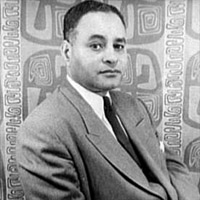
Ralph Bunche
Bunche was the first black person to win the Nobel Peace Prize, awarded in 1950. Born in Detroit, Michigan, Bunche and his sister were orphaned in 1915 and reared by their grandmother in Los Angeles. A brilliant, industrious student, Bunche graduated from Jefferson High School in 1922 as class valedictorian but was barred from the honor society because of his race.
In 1927, Bunche graduated from the University of California at Los Angeles, where he had excelled both in and outside the classroom. He wrote for the school newspaper, won oratorical contests, was sports editor of the yearbook, played guard for three years on the basketball team, and became Phi Beta Kappa. He then entered Harvard University, where in 1934 he became the first African American to earn a Ph.D. in government and international relations.
While completing his doctoral studies, Bunche joined the faculty at Howard University, where he established and chaired the political science department and served as special assistant to Howard’s president. He organized the Joint Committee on National Recovery to lobby Congress for black participation in New Deal programs and to fight against racial discrimination in New Deal agencies. He also helped form the National Negro Congress in an effort to arouse blacks to work for social and economic progress and to unite black and white workers.
For Bunche, the so-called Negro problem in America was rooted more in economic and class conflict than in racial antagonism. He was one of Gunnar Myrdal’s six staff members for the study of race relations that resulted in the monumental two-volume An American Dilemma in 1944. Bunche wrote extensive memoranda on black politics, organizations, leadership, and ideology for the study.
After the United States entered World War II, Bunche took a leave of absence from Howard and joined the Office of Strategic Services as senior social scientist for research on Africa and other colonial areas. Given his doctoral research on colonial administration, he was the foremost American authority on colonialism in Africa. In 1944, he moved to the State Department, where he supplied advice on dependent territories for U.S. representatives to the Dumbarton Oaks Conference and the meetings that established the United Nations. Bunche helped draft the trusteeship provisions of the U.N. Charter and assisted in organizing the Division of Trusteeship at the United Nations, becoming its director in 1947. That same year, he became secretary to the U.N. Special Committee on Palestine and acting mediator in 1948 after the assassination of the first mediator, Count Folke Bernadotte of Sweden. Bunche earned high praise from all quarters for his deft handling of the armistice negotiations that ended the Arab-Israeli conflict in 1949 and won him his Nobel Peace Prize. He became the U.N. under secretary general in 1955 and directed U.N. peacekeeping missions in the Suez in 1956, in the Congo in 1960, and in Cyprus in 1964.
An indefatigable advocate of human rights at home and peace abroad, Bunche was given the NAACP’s Spingarn Medal, its highest honor, in 1949. He served on the NAACP’s board of directors for 22 years. In 1937, he walked his first picket line for civil rights in Washington, DC; he later participated in the 1963 March on Washington and in the 1965 Selma to Montgomery march for voting rights. In 1953, the American Political Science Association elected him president in recognition of his scholarship and mediation of international conflict, and, in 1963, President John F. Kennedy bestowed upon him the nation’s highest civilian award, the Medal of Freedom.